by Brian Hioe
語言:
English /// 中文
Photo credit: 翁麗淑-歐巴桑來了/Facebook
Translator: Brian Hioe
On October 19th, New Bloom editor Brian Hioe interviewed Obasan Alliance candidate Wen Li-shu, who is running in the Sanchong-Luzhou area of New Taipei City. This is part of New Bloom’s ongoing series of interviews with independent city councilor candidates, as part of its special 2018 election coverage.
Brian Hioe: Could you introduce yourself for readers who may not know you?
Wen Li-shu: I am an elementary school teacher. I have taught for twenty years. I began to participate in social issues—as well as some protests—from college onwards. These had more to do with the Taiwanese independence movement, as well as some feminist issues. But after I entered the workforce, I participated less. I felt that I shouldn’t bring personal views into my work.
Later on, I became head of the information working group at school, responsible for computer work. This was less like teaching and more like fixing things, but I didn’t feel that teaching information technologies should be like this. I hoped to give kids a more focused way of learning about these issues. In the West, they have an organization called Cyberfair, which organizes teachers and students to develop a way of investigative learning, make a website together, and then introduce it to everyone.
I thought this was meaningful, and there is also a center for providing this kind of educational support in Taiwan, so I invited the school teachers and students to participate in their activities. activities, our goal was to get to know a few local issues in Luzhou, and then conduct interviews, help promote the issue, and let people know about it. So we began fundraising.
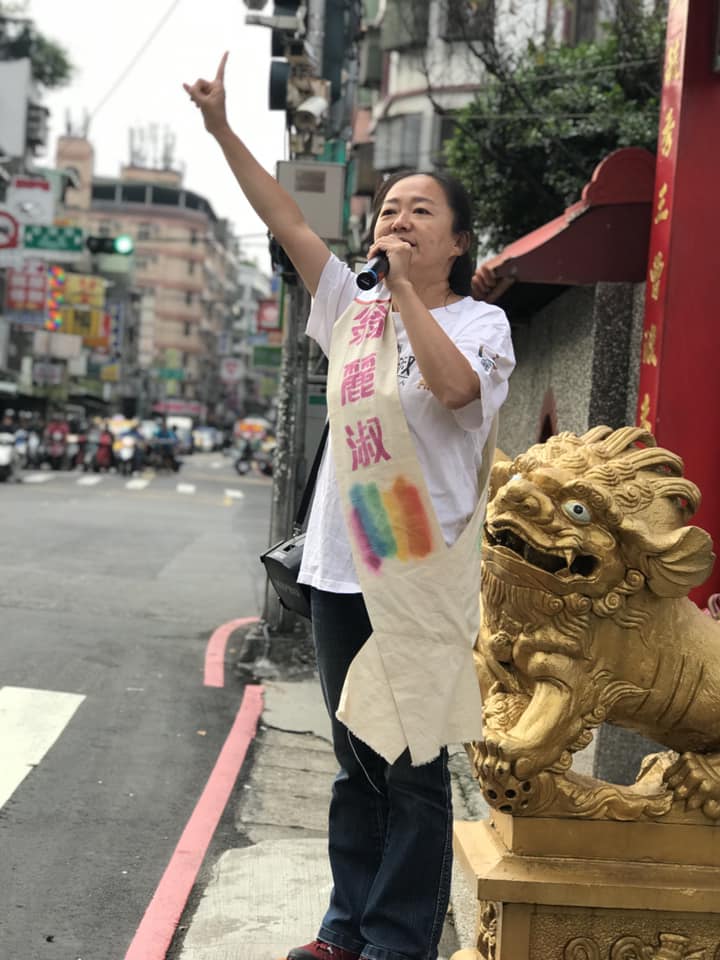 Photo credit: 翁麗淑-歐巴桑來了-新北市三重蘆洲區市議員擬參選人/Facebook
Photo credit: 翁麗淑-歐巴桑來了-新北市三重蘆洲區市議員擬參選人/Facebook
They used to have factories, and there was a tea producer here who grew honey, so we became concerned with local issues. Every year we came up with a new topic or issue to pay attention to. There is an old, historically significant, building here that they were going to demolish and make into a high-rise. We felt that it would be such a shame to lose this piece of culture, so we brought the kids over to get to know the people, and the history there.
We found that kids from this area did not really know the area too well. This also got me to thinking that I did not actually know the history of my hometown very well, I didn’t know how I would introduce it to other people, and explain the places I have deep memories of So I felt that this was quite important to children—that they should have links to the land. We felt this was an important starting point to bring social issues into their education. So we tried this and saw that it was deeply influential on children. I learned a lot from this as well.
We became interested in preserving a historic building in the area and worked very hard of this, including finding local representatives, the Ministry of Culture, and others to discuss with us. Initially, they were very reassuring, saying that there was no problem, that they would work hard and we could preserve the structure. So at the time, it gave us a lot of hope.
The funniest thing was, there was one day we met with representatives from the Ministry of Culture, building contractors, and landlords. We brought our kids with us. We talked about what we had been doing, and they said that, although there would be new buildings, they would make connections with the older buildings, and that this would be an important place in Luzhou where old and new came together. The next day, cranes came in and started knocking things down. We had just talked with them the day before, and the next day they started knocking things down. Some houses also were burned down and we weren’t able to preserve them.
In the process of this, many things happened, and we started thinking about it with our kids. Did we really need so many new buildings? Why did construction companies want to demolish all of this? Discussing all this was much more meaningful than what we were reading in books, so I started to feel like it was okay to bring topics I was interested into the classroom. After that I tried many different things, including inviting victims of political expressions or members of the LGBTQ community to share their experiences, or inviting documentary film victims and migrant mothers. The point was to broaden the horizons for our kids, to let them see new things, and to discuss these issues.
I participated in some NGOs originally, but not too deeply. But for the sake of my students, I tried to more deeply understand some issues. One time, I had the kids discuss the death penalty. After the discussion, I used an author’s essay, which was a bit long, so I simplified it so that the children could understand. One parent did not agree with this and was quite upset that I was teaching kids this, so she complained to the school and to me. But I thought, it’s okay, I can have a dialogue with this parent. I told the parents to not be so worried, that my aim was to encourage independent thinking in children, that this was better than teaching them to be blindly obedient, and so I could see that the parents were gradually coming around to my way of thinking.
I told her about how I taught class usually, how I usually conducted discussions. I did say that I personally supported abolishing the death penalty, but that the children could have their own views. After that, this mother was okay with this.
I wanted to write about this event, but I had to ask the author of the original essay if they were okay with my modifying it, so I wrote to this author, saying that I was sorry I had modified their essay without permission, but asking if I could use it as part of my curriculum for kids. They turned out to agree with me very strongly and later introduced me to a reading group. I got to know more people there and participate more deeply.
After that, starting in 2010, I began to participate more deeply in various organizations, taking on positions as a chair member or board member, and this kind of work. This includes the Taiwan Alliance to End the Death Penalty—where I am a board member—the Human Rights Network for Tibet and Taiwan—where I am also a board member—and the Taiwan Gender Equity Education Association, as well as Parents Participating in Education, both groups whose values are close to some NGOs. Up till now, I still draw many resources from this, and it helps me with my teaching.
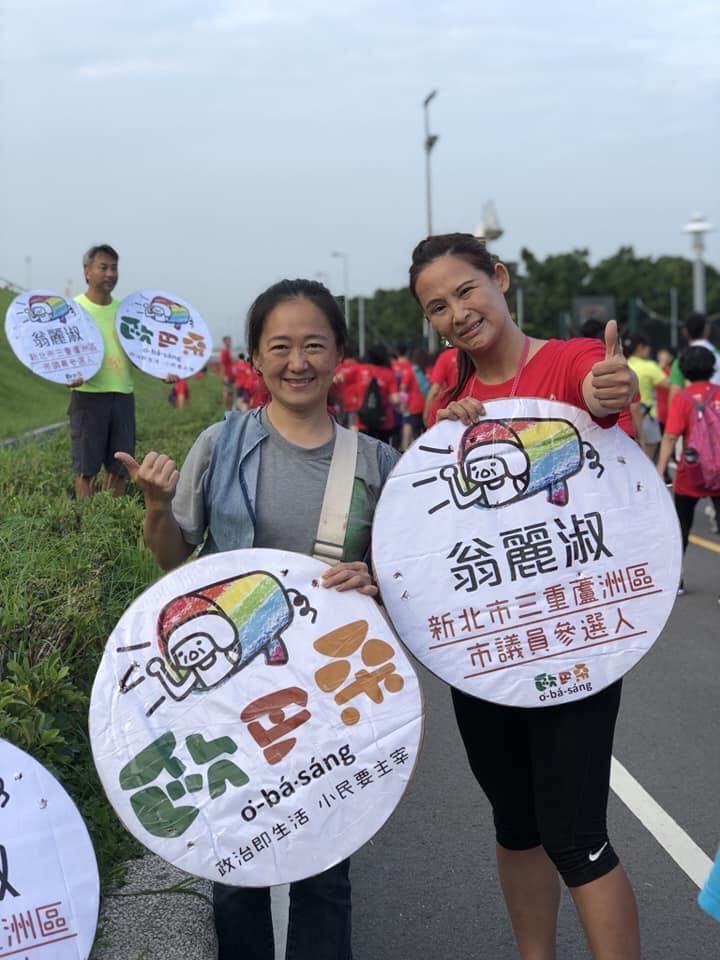 Photo credit: 翁麗淑-歐巴桑來了-新北市三重蘆洲區市議員擬參選人/Facebook
Photo credit: 翁麗淑-歐巴桑來了-新北市三重蘆洲區市議員擬參選人/Facebook
BH: From your background in social movements, why would decide to participate in elections?
WL: Like I described, I felt that there were too few things I could do as a teacher. There is a small window of opportunity to encourage critical thinking in children, so I had to find ways to stimulate children. But I still felt that if the system didn’t change, what I could do was limited. I came to feel that there were some setbacks in what I could do as a teacher.
Later on, the Obasan Alliance was formed. The members were from Parents Participating in Education and they wanted to become a political force. Why did they? Before, when we were trying to address various issues, we found that we needed the aid of city councilors, and we would ask them to speak up about some issues in the city council. But we would find that even if we asked them very humbly, they wouldn’t want to help. They might promise to do something for us but then never actually follow up on this.
So we felt that, instead of relying on others, why not just jump in and do it ourselves. We later discovered we could also understand these various issues so if we just worked a bit harder, we could actually do this process ourselves and wouldn’t need to necessarily rely on them. Furthermore, if we delegated certain issues to them, it would then become solely their decision-making. So why not try to enter the city council ourselves? We felt that the current situation in the city council was very bad—it was a dark place. We paid so much in taxes to the city council, but they did things haphazardly anyway.
As a result, we decided to enter and try to oversee things ourselves. We said that we would organize ourselves. We decided to treat running in elections as a form of social movement. We could learn about variations issues in running and, if we were successful in entering the city council, we would be able to bring in ideas about social issues from the outside and actually realize them within.
That was how the Obasan Alliance started.
BH: What do you think is particular about this district? Who are your opponents and what kind of election strategy have you adopted?
WL: What is particular about this area? I believe that the residents here are not usually like people I would encounter—with regards to social activism. They may be more focused on their own lives, and may not have time to focus on other issues. The majority of residents are workers. Everyone works hard to maintain their own lives.
Sometimes it is easy to win votes through campaign promises, such as if you promise to hand out money, they will vote for you. This may be as a way of addressing childcare or pensions. But when canvassing or standing on the streets, you will find that some people are more similar to you. For example, one time, when I was standing on the street, a person stopped and asked about our labor policy. After I told him, he was quite happy, saying that it was rare to find someone who didn’t just side with the government. He was very angry that the government is very favorable to conglomerates. We were both very excited to talk about it together.
Like this, people sometimes can be most concerned about policy which directly affects them.
There have been some times in meetings with local lizhang in which I felt like I had run into some barriers. I set up times to meet with lizhang because they would best understand the issues of their local li. I wanted to ask them about these issues, or the situation of the li, and seeing how they implemented policy. But sometimes this didn’t go too far, it seemed like they didn’t want to talk to me too frankly. I felt that they didn’t want to talk about local issues with a political newcomer. That was my feeling anyway, as a political newcomer.
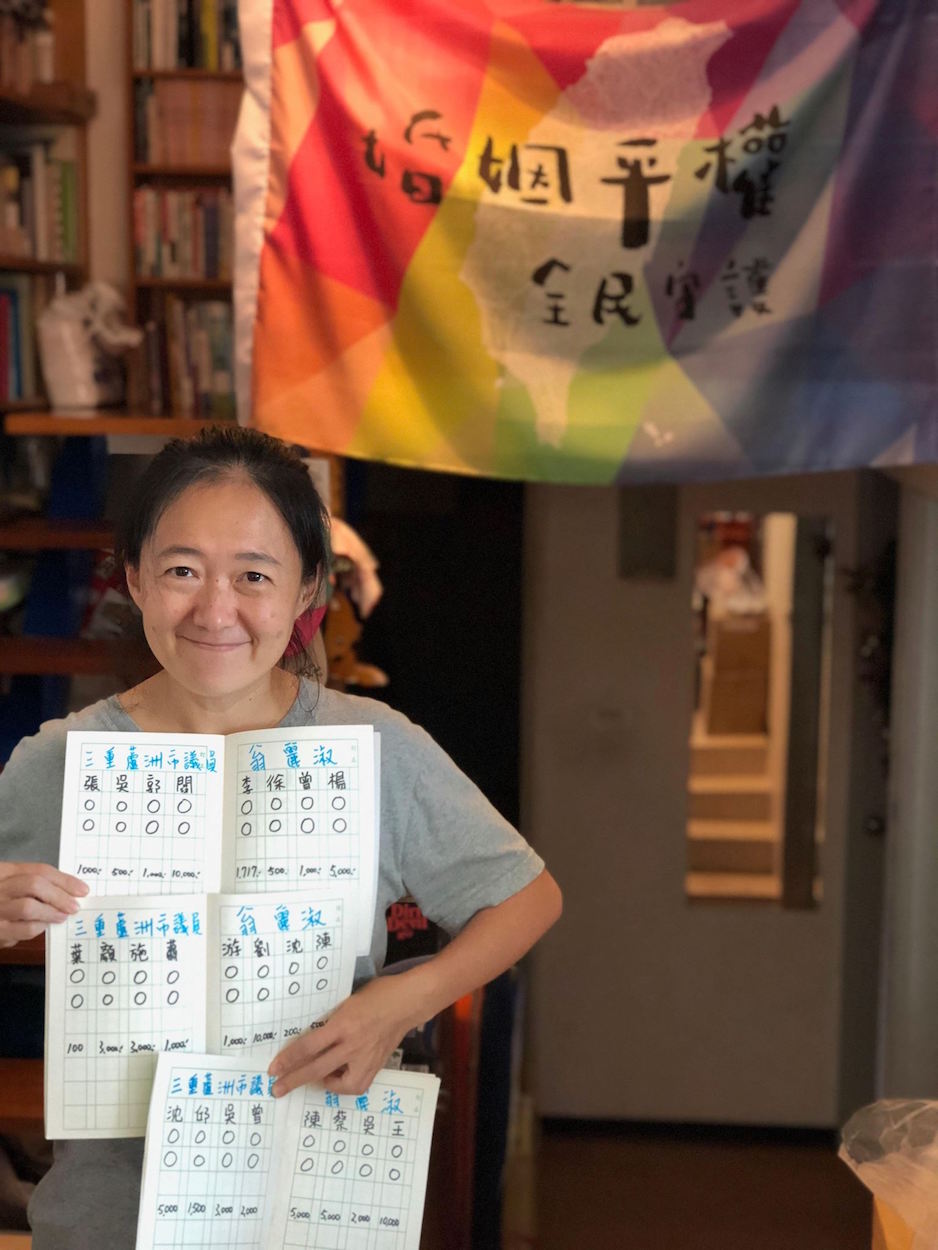 Photo credit: 翁麗淑-歐巴桑來了-新北市三重蘆洲區市議員擬參選人/Facebook
Photo credit: 翁麗淑-歐巴桑來了-新北市三重蘆洲區市議員擬參選人/Facebook
There are some people who were originally already doing things here in Luzhou and Sanchong. Such as the owners of Longlai, a restaurant, whose owner is interested in cultural matters such as literature and art. We found we got along really well conversationally. He hoped very much for the area to become more lively, and not just have bland architecture. Many workers said the same thing. Someone told me about the Air Force Village and I was quite happy to learn about this. Someone also told me about 29th Street, where there are a lot of homeless folks. I felt that these were things and areas I should pay attention to and get involved with. If I hadn’t been running, I wouldn’t know about these places
Most voters are like this, I think. Most people care about their own lives more, but some may be concerned with social issues. Apart from this, I’ve discovered that if people are just willing to engage in dialogue with me, it’s very easy to get along and understand each other. . This is my strategy, since I can’t afford too many billboards. I also don’t have an office. Other people have large offices, but I don’t have the money for this, nor would I want to. Because this is overbearing and, then, what is it that you want to promote? I want to rely on the connection between people, and so I want to stand on the same side as many people.
Some groups are our primary support base, such as mothers, children, workers. These are people who make demands of me. For some young people, because their expectations of society are higher, they may hope for a new person to run. From what I see, there are also those who try to buy people off in elections, but I still see some hope.
Recently, I’ve been standing on the bridge every morning. Everyone goes to work every day and it’s like I’m going to work like everyone else, too. I start very early, at 7 AM. We are all workers and we all go to work in Taipei city. So I stand on the bridge to Taipei and tell people what kind of a group we are and the issues we hope to be concerned with. I hope we are different from other candidates in that regard.
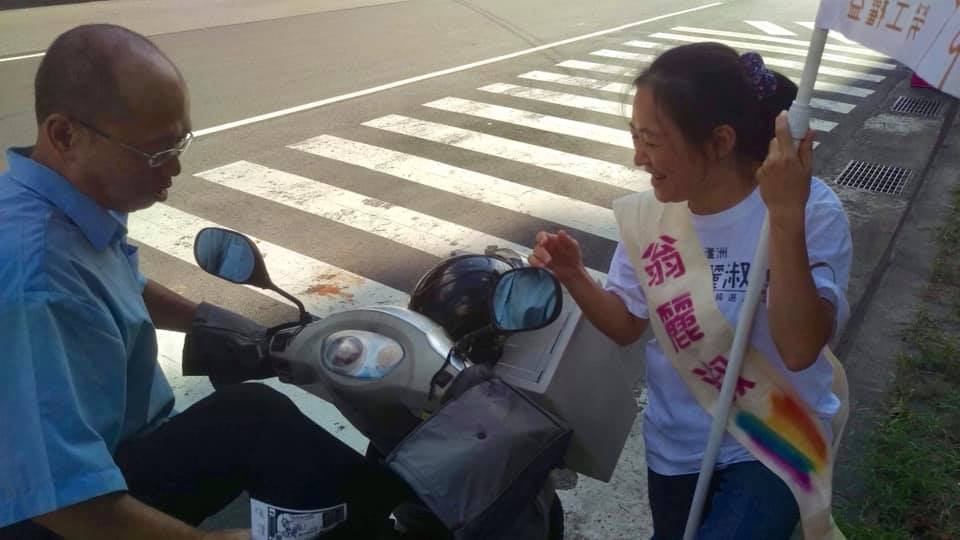 Photo credit: 翁麗淑-歐巴桑來了-新北市三重蘆洲區市議員擬參選人/Facebook
Photo credit: 翁麗淑-歐巴桑來了-新北市三重蘆洲區市議員擬參選人/Facebook
A lot of these candidates’ all make promises regarding building activity centers or parking lots. We want to remind everyone that, as a city councilor, what is most important is to be concerned with the welfare of children. When people only talk about building infrastructure projects, I feel like it’s very distant from our real lives. We hope to push for educational reform and childcare reform, not just policies that are just about handing out money, but reform that establishes many different kinds of support to let people be at ease, and ensure comprehensive care for their children. This way, parents won’t have to worry about their children being neglected or ignored by a caretaker. We would like to push for these policies rather than just ignoring this like some people.
Building a parking lot won’t resolve these problems. On the other hand, building a childcare center might, where you have enough space, and nannies can bring their kids together. There are many nannies in this district and everyone can get to know each other and to let the kids know that as well. But if there’s a nanny who is not okay, we can respond to this together, and the city government can also play a role in connecting people, arranging some activities and providing some classes. This can instill values of caring for each other in people, which is something we very much need in the present.
If we had spaces like these, it could make the area here better. We already have too much space taken up by building projects. I also hope to make the city better for those with visual or hearing impairments, or those who need to travel by wheelchair. As it is now, I think the city is not easy for them. I also hope to support groups such as migrant workers, who may not be able to understand Chinese, as the city doesn’t have anything in their languages, and so they may have a hard time. Furthermore, they are unable to vote, and I think it’s our job to provide support to marginalized groups such as them.
For example, the government should provide materials in Indonesian, Thai, and not just English. If they understand English, they may be okay, but oftentimes those who are taking care of the elderly are Indonesian or Thai. We also build some facilities for them, to allow them to get to know the city better, and what the places they can go are. Isn’t it a shame otherwise? We need to protect their needs, to build linguistic infrastructure for them, and build infrastructure and spaces for those hard of hearing or have vision.
Also, there are many members of the LGBTQ community in Sanchong and Luzhou, but at the same time, it is a place with many traditional values. In this way, I believe we should create welcoming spaces for gay communities and in this way promote values advantageous to them to influence some people, and help them realize that LGBTQ people are no big deal, that they, in fact, are you can befriend, rather than fearing them. This is the kind of city I hope for, but it will take time to promote this kind of city.
BH: What do you think is the largest challenge you face in your election campaign? What is different between yourself and other candidates?
WL: The biggest difference between myself and other candidates is that I don’t have a large team behind me. For example, today, when we were drawing lots for our campaign numbers, everyone else hard a large team with them, and some even brought musicians. It’s quite amazing. I only went with two friends. I think resources is another large difference. I don’t want to spend so much money on stuff like buying up billboards. Between looking at myself and a large billboard, I think what voters would pay more attention to is me, so I want to do things to let voters recognize me in that way. But each candidate has so many and they’re so big as well! So many people ask me why they have not heard of me when they receive campaign materials from me.
Another thing is the current set of council members have been in power for a very long time. And even if they are new, they might be the children or wives of current city councilors, or they may be second-generation politicians or second-generation wealth. More similar to me may be Chen Zhi-ming of the New Power Party, but his voice is still larger than mine. He has a campaign truck and campaign advertising such as billboards—although certainly not as much as other candidates.
But I have no way to do things like that. All of our people are all volunteers and we are all working on this because of our values. We have to take care of everything ourselves. We also try to address things through our political views, whereas other people might avoid this, for example, in regards to infrastructural issues. We hope to do political work, to slowly change the course of politics along with our kids. This also requires much work. Just handing out money would be the easiest means of attracting votes, but we need to spend more thought on this. We often discuss how to better approach this issue in the Obasan Alliance. [Laughs]
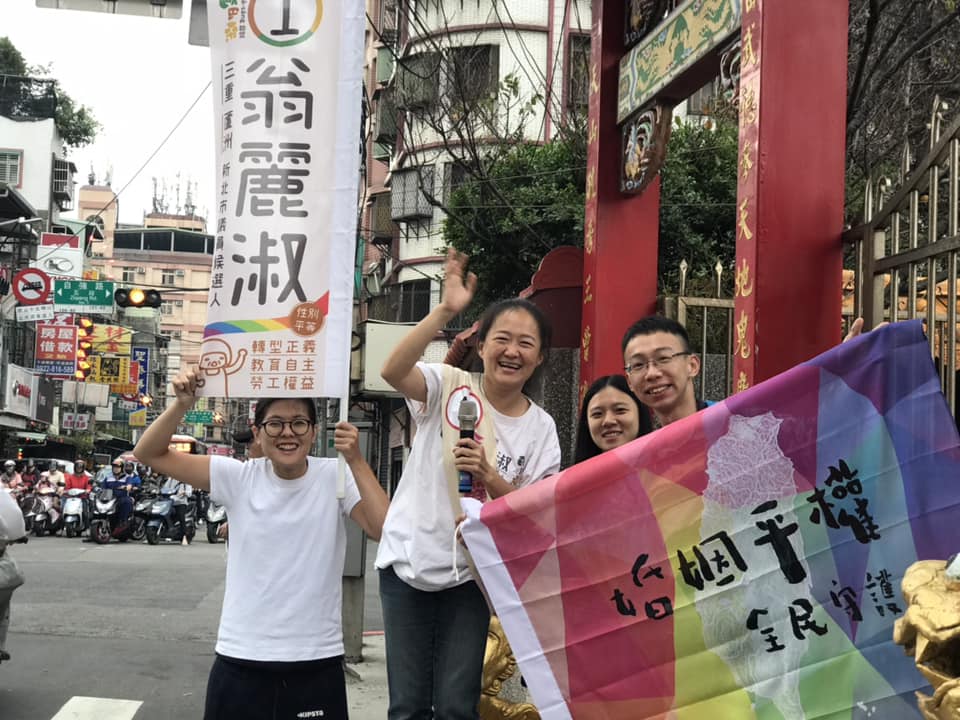 Photo credit: 翁麗淑-歐巴桑來了-新北市三重蘆洲區市議員擬參選人/Facebook
Photo credit: 翁麗淑-歐巴桑來了-新北市三重蘆洲區市議員擬參選人/Facebook
BH: Do you think that the rise of new political forces in Taiwan is similar to trends in other parts of the world? Such as with the rise of new parties or developments like that.
WL: I believe that these are global trends. On the one hand, this reflects the rise of the Internet—that information now spreads faster and is more transparent. It is easier to obtain information on issues we are interested in. Because we all depended on TV, media outlets, books, or newspapers in the past, but information spreads faster now. Furthermore, you have to consider the fact that Taiwan is a post-authoritarian country, so people are still very afraid of politics. I feel that other places in the world are similarly progressing as Taiwan is.
Everyone starts to feel that the world should be different because they’re getting more and more information and realize they can come to their own conclusions on issues. I was originally skeptical of the view that knowledge is power. After all, wasn’t knowledge just stuff to be tested on in school? But now, I think this is statement is actually true, and that, with more information, one can more easily improve our circumstances, and build up a new force to speak up for oneself.
As a result, I’m not too afraid. In the past, you would feel that you were merely a small voice, that you didn’t understand the situation very well, and that your strength wasn’t enough. But it’s not like this now. Many young people feel they are able to try to do things in society or government themselves. This has to do with the liberalization of media, that there are many self-media, and you can see different things, and the same thing can be viewed differently.
For us, this is very good, this is a very good weapon. At the same time, this has also led to the emergence of someone like Donald Trump. After many progressive forces appeared, right-wing forces then suddenly came out in Taiwan as well. For example, it was easy to push for sexual equality education in 2014 and this smoothly passed with no opposition. But now, we see the rise of conservative groups, and I don’t think these reforms are going to pass so easily now. Before they weren’t paying attention to this part of politics, but now they’ve noticed that we’ve even gotten involved in school, the campuses and they realized it was a huge attack on their political front.
In the past, they controlled the campuses, pushing for sexual chastity education. But when they realized we were able to get LGBTQ-friendly education in as well, they saw it as a big threat and so their opposition became more intense. Moreover, oftentimes the right-wing consists of people with resources and money, so this is what we confront in times to come. It’s like the conservative forces the feminist movement confronted in the past. But that was like a hundred year process of fighting. Now I think that it would only take ten years to fight that kind of struggle.
I feel like we’re making progress. Our progress is getting faster and faster. It’s still forward three steps, back two three, but we still move forward. I believe very much in this force and its direction. I am still not afraid of the conservative social forces out there.
BH: What do you think is different about elections this time, as compared to two years ago? Tsai Ing-Wen has been in power for two years and, as we discussed, there has been the appearance of new conservative forces.
WL: Conservative forces appeared at that time as well. But I believe what happened that year had a lot to do with the influence of the Sunflower Movement being too strong. Many people talk about it this way—that even if Tsai Ing-Wen had done very little campaigning, she would have been elected anyway. People were disgusted with the KMT during that time. Sometimes I wonder if Taiwanese people are just very forgetful. Because even before what happened two years ago, people knew what the KMT had done in the past, so how could they return to being under the KMT’s governing?
I think because when Chen Shui-Bian was president, many issues blew up, and he was ridiculed a lot. After his popularity declined, people felt so disappointed with the DPP that they were willing to give the KMT another chance. But after seeing that they couldn’t continue with the KMT either, the circumstances led many hopes to be placed on the DPP, and I think many people did remember that many things had been unable to be accomplished under Chen Shui-Bian. This time, there were many hopes, but after two years, people feel disappointed again. I also felt disappointed, because I also had many hopes.
Many people wonder if they themselves were wrong in having these expectations, but regardless, it is still shocking that the DPP would not address basic issues regarding labor rights, marriage equality, etc., and that they would pay so much attention to the other side’s politics if they knew their own supposed values were right. Why would staying true to these values it be hard? So it’s a shock to us. Many people are pleasantly surprised when they hear we are running as independents without any political party, and they will want to know what our political views are.
There was one time someone refused our campaign materials and shook his head. But when I mentioned that I was an independent and that we are a group of mothers who had decided to run as independents, he came up and asked if we were DPP? When I said we weren’t, just that part of my campaign clothing is green, he was very interested in reading our materials. So everyone is hoping n for new political forces to enter politics.
But I also have to say, I feel that because the DPP took power and people are disappointed, it is possible that the KMT will have some resurgence. This is not impossible, compounded with the rise of the political right. We see this with the push for nuclear energy, as well as the anti-gay marriage referendum. I believe that this sort of right-wing thinking has emerged and has the potential to influence people. In relation to that, in the past many people have been excluded from the political process and don’t know how to engage in different aspects of politics, therefore its very easy for them to grab onto these conservative politicians. But I think it’s fine, whoever it influences, it’ll influence.
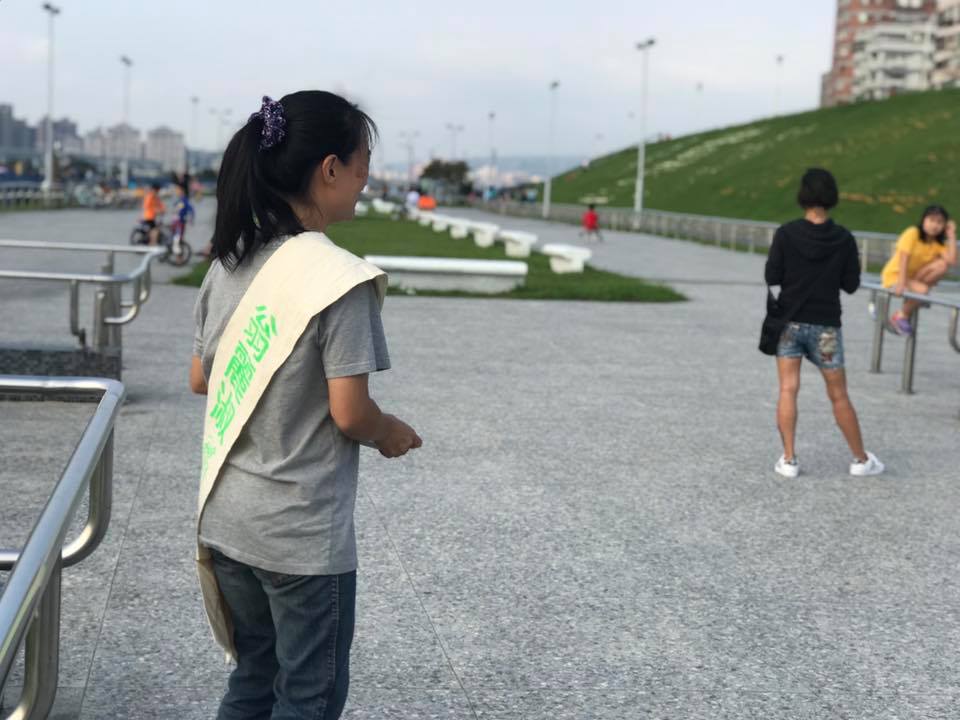 Photo credit: 翁麗淑-歐巴桑來了-新北市三重蘆洲區市議員擬參選人/Facebook
Photo credit: 翁麗淑-歐巴桑來了-新北市三重蘆洲區市議員擬參選人/Facebook
BH: Is there anything you would like to say to readers in closing? Both Taiwanese and international readers.
WL: I very much hope that everyone can watch the changes taking place in Taiwan. Many people have moved me, in that they all work so hard to make a living, but they are still willing to provide support to a regular person seeking to enter politics. Even if they just donate small donations of 100 NT or 200 NT, I don’t think the point is the money, but rather it shows that they have hopes and expectations for Taiwan.
So I feel that I have hopes as well. I don’t think that Taiwanese independence is far, although we may have a large monster next to us. If we rely on ourselves, we don’t need to fear, and so I feel that we can create changes on the path to Taiwanese independence. In this process, I really feel that we can loudly say we support Taiwanese independence and that many people are willing to support it. I think this is different from in the past, when people were afraid to say this. Now people can say this proudly.
I think that these things take time. I believe that there will be many changes and I hope for people to look carefully at Taiwan, not just to feel that it’s being eaten up by China. Many things can change and we are on the edge of change, on the road to freedom and democracy. There will be setbacks, but everyone is changing, and we are setting out on a new road.

